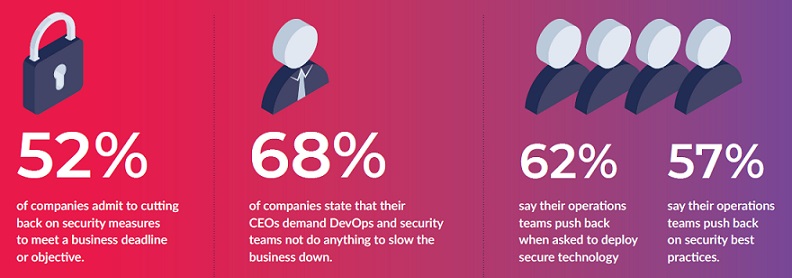Check Point® Software Technologies Ltd.(link is external) has emerged as a leading player in Attack Surface Management (ASM) with its acquisition of Cyberint, as highlighted in the recent GigaOm Radar report.
More than half of companies (52%) admit to cutting back on security measures to meet a business deadline or objective, according to a SecOps research report released by Threat Stack.
As further evidence that companies are sacrificing security for speed, Threat Stack found that 68% of companies say their CEO demands that DevOps and security teams not do anything that slows the business down. But that pressure doesn’t just come from the corner office, as 62% of companies also admit that their operations team pushes back when asked to deploy security technology.

“Businesses have grappled with the ‘Speed or Security’ problem for years, but the emergence of SecOps practices really means that companies can achieve both,” said Brian M. Ahern, Threat Stack Chairman and CEO. “The survey findings show that the vast majority of companies are bought-in, but unfortunately, a major gap exists between the intent of practicing SecOps and the reality of their fast-growing businesses. It’s important that stakeholders across every enterprise prioritize the alignment of DevOps and security.”
The SecOps Reality Gap
The purpose and intent of SecOps is to build towards distributing security decisions at speed and scale to those who hold the highest level of context without sacrificing the required controls. Survey respondents demonstrated a clear understanding of the importance of SecOps to the overall success of their business, with 85% saying that SecOps is a goal for their organization.
Despite clear intent to implement SecOps, only 35% of respondents say SecOps is completely or mostly an established practice at their organizations, while only 18% say it’s not established at all. These numbers dwindle according to specific job roles: 25% of security professionals believe that SecOps is an established practice at their companies, while only 10% of DevOps professionals agreed.
DevOps and Security Teams Operating in Silos
To help understand the obstacles to implementing SecOps, Threat Stack’s research found that challenges are primarily centered on organizational alignment as DevOps and security teams are not routinely integrated.
■ 44% of developers are not trained in secure coding, and 42% of operations staff are not trained in basic security practices.
■ Only 40% of respondents agree that DevOps are always incorporated into security processes.
■ A security specialist is a part of only 27% of Ops teams and 18% of Dev teams.
■ When respondents were asked whether they have the ability to fix a security-related issue themselves, 44% of DevOps respondents said they rely on someone else vs. 35% of security respondents.
■ 41% of DevOps professionals rated their organizations’ ability to detect and remediate security incidents as “average” vs. 35% of security professionals.
The Cloud Security Consequences
The speed of today’s business is driving companies to capitalize on the business benefits of cloud infrastructure and automation in order to compete. Threat Stack’s survey showed that the lack of SecOps adoption impacts the security of this infrastructure, given that more than half of the participating professionals rated the security of their organizations’ cloud infrastructure and environment as average or worse.
Industry News
GitHub announced the general availability of security campaigns with Copilot Autofix to help security and developer teams rapidly reduce security debt across their entire codebase.
DX and Spotify announced a partnership to help engineering organizations achieve higher returns on investment and business impact from their Spotify Portal for Backstage implementation.
Appfire announced its launch of the Appfire Cloud Advantage Alliance.
Salt Security announced API integrations with the CrowdStrike Falcon® platform to enhance and accelerate API discovery, posture governance and threat protection.
Lucid Software has acquired airfocus, an AI-powered product management and roadmapping platform designed to help teams prioritize and build the right products faster.
StackGen has partnered with Google Cloud Platform (GCP) to bring its platform to the Google Cloud Marketplace.
Tricentis announced its spring release of new cloud capabilities for the company’s AI-powered, model-based test automation solution, Tricentis Tosca.
Lucid Software has acquired airfocus, an AI-powered product management and roadmapping platform designed to help teams prioritize and build the right products faster.
AutonomyAI announced its launch from stealth with $4 million in pre-seed funding.
Kong announced the launch of the latest version of Kong AI Gateway, which introduces new features to provide the AI security and governance guardrails needed to make GenAI and Agentic AI production-ready.
Traefik Labs announced significant enhancements to its AI Gateway platform along with new developer tools designed to streamline enterprise AI adoption and API development.
Zencoder released its next-generation AI coding and unit testing agents, designed to accelerate software development for professional engineers.
Windsurf (formerly Codeium) and Netlify announced a new technology partnership that brings seamless, one-click deployment directly into the developer's integrated development environment (IDE.)













